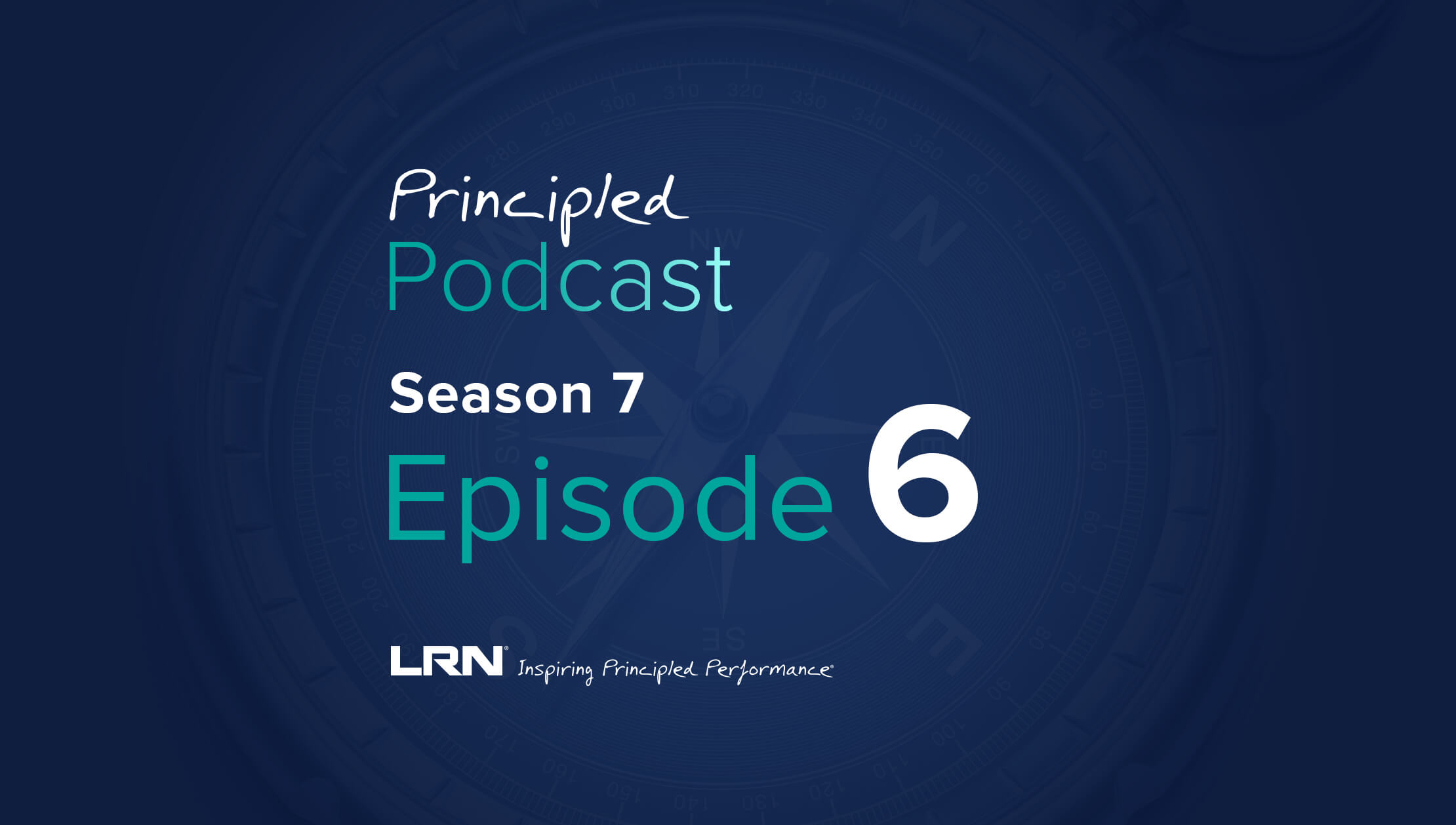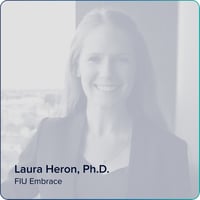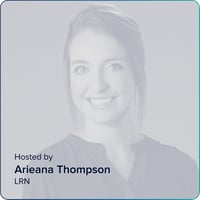What you'll learn on this podcast episode
DEI impacts nearly every aspect of a business. It touches hiring and training efforts, policies and procedures, and even influences company culture and performance. LRN’s 2022 Ethics & Compliance Program Effectiveness Report found that 76% of high-impact E&C programs will be prioritizing DEI initiatives in the coming year. So, how can organizations ensure that their efforts are effective and meaningful? In this episode of the Principled Podcast, Dr. Arieana Thompson hosts a conversation about DEI with Dr. Laura Heron, a chartered occupational psychologist and advocate for inclusion in the workplace. Listen in as the two discuss how businesses can develop an organizational perspective on DEI, and what creating a culture of acceptance and fairness looks like in today’s world of on-site, hybrid, and remote work.
Additional resources:
LRN’s new DEI Program provides companies with a multi-faceted training solution—a ready-to-deploy learning campaign with curriculums, asset packs, and customizable courses, plus the option to add bespoke content, learner experiences, and communications campaigns developed in association with LRN’s E&C experts. You can preview some of our most popular course content (just one piece of this program!) by clicking here.
Where to stream
Be sure to subscribe to the Principled Podcast wherever you get your podcasts.
Guest: Dr. Laura Heron, Ph.D.
Dr. Laura Heron advocates for inclusivity in the workplace. She believes that every person, no matter their background, age, gender, ability, or any other characteristic or identity, deserves to have opportunities for meaningful employment.
Laura is a BPS Chartered Occupational Psychologist, who graduated with her Ph.D. in Industrial and Organizational Psychology from Florida International University. Laura currently works on an employment initiative for FIU Embrace, which is a university-wide initiative at Florida International University that promotes the wellbeing and employment of young adults with developmental disabilities (DD). She researches and consults on improving the employment experiences for individuals with DD and supports companies in creating the infrastructure needed to cultivate inclusivity. She is passionate about conducting research and implementing evidence-based approaches to improve the lives of young adults with DD.
Laura’s research has been published in leading academic journals in Industrial-Organizational Psychology and disability-related fields. As a disability-employment expert, Laura engages in professional speaking and presents research at national conferences. Laura’s work in the area of disability-employment has been recognized by the Society for Industrial/Organizational Psychology and the American Public Health Association.
Dr. Arieana Thompson believes in transforming the modern-day workplace through thought-provoking, evidence-based insights.
Arieana is a subject matter expert in executive leadership, succession management, ethics and compliance (E&C), wellness cultures, and employee development. Arieana has experience advising in external and internal capacities and professional speaking. Arieana offers professional and wellness coaching, helping leaders and individuals to harness natural strengths and reduce stress.
As a scientist-practitioner, Arieana actively researches and publishes employee well-being, organizational culture, and leadership thought-pieces in both industry and peer-reviewed academic journals (see links in the "Featured" section below). These publications enable executives to create and sustain values-led, profitable, and creative companies.
Principled Podcast transcription
Intro: Welcome to the Principled Podcast, brought to you by LRN. The Principled Podcast brings together the collective wisdom on ethics, business, and compliance, transformative stories of leadership, and inspiring workplace culture. Listen in to discover valuable strategies from our community of business leaders and workplace changemakers.
Dr. Arieana Thompson: DEI has become one of the most important acronyms for organizations today. Standing for diversity, equity, and inclusion, DEI impacts nearly every aspect of a business. It touches hiring and training efforts, policies, and procedures, and even influences company culture and performance. LRN's 2022 Ethics and Compliance Program Effectiveness Report found that 76% of high-impact E&C programs will be prioritizing DEI initiatives in the coming year. So how can organizations ensure that their efforts are effective and meaningful?
Hello, and welcome to another episode of LRN's Principled Podcast. I'm your host, Dr. Arieana Thompson, E&C advisor at LRN. Today I'm joined by Dr. Laura Heron, a chartered occupational psychologist and advocate for inclusion in the workplace. We're going to be talking about how businesses can develop an organizational perspective on DEI. We will also examine what creating a culture of acceptance and fairness looks like in today's world of onsite hybrid and remote work. Laura is an expert in this space, consulting on improving the employment experiences of individuals with developmental disabilities, also referred to as DD, and conducting ongoing research. She supports companies in creating the infrastructure needed to cultivate inclusivity and is passionate about conducting research and implementing evidence-based approaches to improve the lives of young adults with DD. Her work in the area of disability employment has been recognized by the Society for Industrial-Organizational Psychology and the American Public Health Association. Laura, thanks for coming on the Principled Podcast.
Dr. Laura Heron: Thank you so much for having me on this podcast. I always jump at the opportunity to talk about DEI as it is so important and something that I am very passionate about. So I'm excited to jump right in.
Dr. Arieana Thompson: Laura, we're excited to have you. Let's start right there. Do you mind defining DEI for us today?
Dr. Laura Heron: Sure. Essentially DEI refers to the organizational policies and practices that promote the representation and participation of different groups of employees. For example, this can include people of different race, ethnicity, nationality, sexual orientation, gender, religion, socioeconomic status, age, and physical and mental ability or disability among many others. If you take a second to think about what these words mean individually, diversity is defined as the range of human differences. Equity refers to freedom from bias or favoritism. And inclusion is the state of being included or a part of something. So when you take DEI altogether as a whole, it really involves understanding, acknowledging, accepting, valuing, and even celebrating all differences.
I do want to mention here that you can't just commit to one area and not the other two. It's not enough to diversify your workforce as many organizations are recognizing you need to do. You must also create the infrastructure that promotes and reinforces equitable practices and an inclusive culture to really invest in DEI and make sustainable change. So that's really a snapshot definition of DEI as it applies to the workplace.
Dr. Arieana Thompson: That was wonderful. Can you tell us more about why businesses should care about DEI and what might be some of the benefits of investing in this area?
Dr. Laura Heron: Sure. I get asked this question a lot and I always just want to say that it is simply the right thing to do. I think morally as human beings, we should want every person to have opportunities for meaningful employment. And not only that they have access to employment, but they get to experience a workplace where every person feels that they belong, that they feel comfortable, and that they feel valued. But I do recognize that in a world that is often driven by tangible gains, the business case is important to touch on. So briefly we know from a lot of research that DEI initiatives can boost innovation, collaboration, they can expand your customer base, they can reduce employee turnover, and they can also help you to attract talent. And become of all of that, committing to DEI can increase profits. So if the human element isn't enough of a driver, then there's the research evidence telling us that DEI gives you a competitive edge in the labor market.
Dr. Arieana Thompson: It certainly sounds like investing in DEI is a win-win. Can you tell us more about your own experiences working in DEI and your area of research?
Dr. Laura Heron: Sure. For four years now, I've been working for a program at Florida International University called FIU Embrace. And we are an initiative that promotes the wellbeing and employment of young adult with developmental disabilities. I'll give a quick definition. Developmental disability, it's really a broad umbrella term that describes a group of conditions that occur due to impairment in physical, learning, language or behavior areas. Examples include intellectual disability, autism, ADHD, and Down syndrome to name just a few.
I am currently working on an employment initiative to help our students graduate from the college program with a meaningful job. And this is so important because people with developmental disabilities have really devastatingly low employment rates. Prior to the pandemic, only about 19% of individuals with developmental disabilities were employed. And that's compared to about 70% of people without disabilities. So this really just shows us how wide that gap is. And the pandemic unfortunately has severely impacted industries commonly occupied by people with developmental disabilities, such as food and service industries. So this gap unfortunately will likely be worse now.
But I've done a lot of disability employment research in the past few years with FIU Embrace and with FIU's Healthy Work Lab led by Dr. Valentina Bruk-Lee, which is where I completed my Ph.D. in IO psychology. And as part of the college program, our Embrace students get internships both on and off-campus to help them develop basic job skills to ready them for life after college. A lot of our work and research involves helping organizations create the infrastructure to support them, for example, by understanding supervisor skill and knowledge gaps and developing training for supervisors. And we're also working on other aspects of the employment pathway, for example, how do we assess organizational readiness, or how do we match students to jobs?
So there is a lot of work to do in this space, but it's something that is growing. In the past few years, we've seen a lot more research or attention on this population, particularly as it applies to work. So that is really exciting. But I will say the main takeaway from my work that I would like to share is that while people with developmental disabilities may face unique stresses in the work environment, with the right supports, they can thrive and be an asset to any company just like any other employee. And what we found is that the types of supports that are needed are often free and will actually benefit all the employees on a work team, not just people with developmental disabilities. I could really talk about this all day, but I know we have some great questions to get to. So I'll hand it back to you, Arieana.
Dr. Arieana Thompson: Absolutely. No, I actually love what you're saying right there about a few more steps that organizations can take in order to support individuals with developmental disabilities. So based on your professional experience and background, what in your opinion are a few practical steps that businesses can take to ensure that their culture is inclusive and supportive of employees with developmental disabilities?
Dr. Laura Heron: Sure. That's a great question. I think the first step to being inclusive of this population is to gain an understanding of what developmental disabilities are. Within the umbrella of DD, there are different support needs, work preferences, communication styles, or language preferences. So it's important to be aware of those so that you can best support them.
It's also important to know that there are a few different pathways to employment for people with developmental disabilities. For example, a lot of our students at Embrace have intellectual disabilities as well as other types of developmental disabilities. So they'll typically go through a college program like Embrace to get employed, or they go through what we call supported employment, which are state-run or independent providers who help people with disabilities find work. In light of that, to be inclusive, you may need to diversify your recruitment strategies or build partnerships with supported employment agencies. I often say that organizations shouldn't just rely on automated resume screening, for example, as this can end up modernizing a lot of people with disabilities.
Another way to be inclusive of people with developmental disabilities is to offer DEI training that includes information about developmental disabilities. So it's unfortunate, but this really happens. And often these trainings leave out mention of disability at all, let alone, particularly invisible disabilities like many types of developmental disabilities. I guess, in line with that, training managers is important. Some people with developmental disabilities can have those unique stresses in the work environment. So it's important that supervisors are equipped with the skills and knowledge to support them.
I think a last point is that we are seeing more companies, particularly in the US, but abroad as well, that are creating disability inclusion programs, particularly for employees with developmental disabilities. So I'd encourage anyone to learn from these companies who are leaders in this space. Some examples include Walgreens, Sephora, Microsoft, or even SAP to name a few. At the end of the day, you're already going to have people in your organization who have a developmental disability, whether it's disclosed or undisclosed. So every organization has that responsibility to ensure that each employee is supported and that they can come to work in a happy and healthy environment. Recent data tells us that one in seven children in the US are being diagnosed with the developmental disability. So it's really time for organizations to step up and be inclusive so that they can grow up and find a meaningful job.
Dr. Arieana Thompson: Excellent point, Laura, that is so true. Something you've said to me in the past is that you've learned through your work in inclusion related to developmental disabilities, that this can also create an environment of inclusivity for other often marginalized groups in the workplace that we care about and focus on when we consider DEI initiatives. Can you talk a little bit more about that and just maybe a little bit broader, what advice do you have for companies getting started. And then I know I'm throwing a lot at you, but also how do you sustain positive change once you do get started?
Dr. Laura Heron: Sure. I think a good place for any company to start is by doing an assessment of key systems, including their culture, their recruitment strategy, selection strategy, onboarding, socialization, training, performance management, and even career development. For example, when you think about your organizational culture, ask yourself, is DEI a visible part of the culture? How does DEI tie into organizational values and norms for behavior? Do leaders display behaviors that promote inclusion? And what about employees? Do they know what's expected of them? Is the organization authentic in its communication about DEI? How does culture manifest at the team level? In big organizations, team climates can be very different. So this is also something to think about. I think part of this assessment of those key systems can include a survey or focus groups to gather input from your employees. Listening to their perspectives and opinions can help you to understand A, where change is needed, but also it can help you to assess their appetite for change.
And finally, I would suggest learning from others who are doing it right. I wish there was more collaboration and openness between organizations. You don't always have to necessarily reinvent the wheel. There's a lot of organizations doing really good work in the DEI space. So I think we can learn from them.
And then I think the second half of that question was how do we sustain positive change when it comes to DEI? I think to create sustainability, it requires a continual reassessment of those key systems I just mentioned. And this is important because work is constantly changing. For example, what we know now about language preferences, when it comes to disability, for example, and other areas of identity has drastically changed compared to a few years ago, even.
I think another important part of making DEI sustainable is accountability. Are there evaluation and accountability mechanisms in place throughout the organization that are specific to DEI? For example, do leaders have DEI goals as part of their performance evaluations? Or is there a DEI advocate or champion who can oversee DEI efforts? Is data on inclusion made available to all employees because transparency is important? And I say this because I actually read recently that one of the main reasons DEI initiatives don't work is because of a lack of metrics in place to track progress. So this accountability piece is really critical.
I mean, I could go on for hours about this, but something else that can help with sustainability is keeping DEI in mind when making decisions. We know that organizational change is inevitable and is even important for growth but bear in mind that any change both big or small can impact your employees. So when decisions are being made, being aware of DEI and how these decisions impact all employees is needed.
And lastly, I'm actually currently participating in a training program on universal design for learning. It's a really cool concept that I did want to share with you all. You may have heard about UDL applied to education. It involves making courses and campuses usable for everyone, but it's a concept that's actually recently being applied to the workplace. So I did want to touch on it briefly in case anyone's interested in learning more and I'd really encourage you to check it out, but essentially it involves the design of products and environments to be usable by all or people without the need for adaptation or specialized design. So it can be applied to the work environment, for example, by having wider hallways, it can be applied to someone's work station, tools and technology, and also policies and practices. But basically, it means approaching work in a way that is inclusive of all differences, which I'm all about. And I mention it now because if we can design workplaces with UDL in mind, then I think that will greatly help with the sustainability of DEI efforts.
Dr. Arieana Thompson: Absolutely. Thank you for that comprehensive answer, Laura. I love what you talk about around getting started with a real awareness of where you're at, but then how you tie it back together with sustaining it through those metrics of accountability. That's excellent.
For those organizations that have gotten started and are perhaps having a few different people within the organization running these efforts, can you talk a little bit more about how we could get the entire company on board with DEI efforts and really spread it throughout the entire organization?
Dr. Laura Heron: Yeah, I think it'll come as no surprise, but that top-down support is critical. I did mention earlier, but there does need to be a champion of DEI who is trusted and respected and who cares. And this can sometimes be the CEO or a top-level manager or someone else, but having that authentic support for DEI efforts from leadership will help to get everyone on board.
I think another important thing to talk about is visibility. Incorporate DEI into your values and your organizational strategy, be transparent in how you're going to make your organization more diverse, equitable, and inclusive, and also follow through on those commitments. I think this is an important point. A lot of organizations might brand that they have DEI efforts and they care about DEI, but practice and policies aren't necessarily in a place that supports that mission. DEI is now something a lot of applicants will look for, but they're going to know to look deeper than just a page on a website, for example. They're going to want to see an ongoing commitment with those initiatives in place.
I think another way to get everyone on board is to develop DEI training that is in-depth and frequent. There are a lot of trainings out there, so it's really important to carefully consider what topics are covered in those trainings. You can ask yourself, is that training representative of different groups? I mentioned earlier that invisible disabilities such as developmental disabilities, a lot of those are often not included in diversity trainings. But another question to ask yourself is, does the training encourage thought-provoking discussion? A lot of times they're offered online as sort of a legal check in the box and do not actually get people learning and engaged in the content. And I really think just being aware of these concepts isn't enough. Part of learning involves hearing stories, communicating with others from different backgrounds, and applying that knowledge and practice. So I would really encourage anyone to try and incorporate that into those diversity and inclusion trainings.
Finally, does the training clearly lay out behaviors that are considered inclusive? DEI training really needs to be tailored to your organization. Are employees left with a set of behaviors or communication techniques that you expect them to use in your workplace? This is something that's so important, and that personal tie from the training back to the company, the day-to-day company is often missing in those trainings. So I definitely wanted to touch on that.
But I think beyond getting people to communicate in trainings, you can create opportunities for collaboration between different groups. I have an example from MasterCard, actually. They offered reverse mentoring where younger employees who were more social media savvy, mentored older employees so that they could become more familiar with the platform MasterCard users. And I just think this is such a great example of how to get different groups of people together over a shared purpose. And you can also encourage the development of employee networks or resource groups, which are typically voluntary employee-led groups where people with shared characteristics or life experiences get together. A couple of well-known examples include AT&T and Estee Lauder. There are companies that have strong DEI employee networks, and what's really cool about these groups is that they actively work with management in those companies on a number of initiatives aimed at increasing inclusion.
I just love how these groups give employees a voice within an organization, but I think the last two things that can help to bring the company on board include making your commitment to DEI known at the outset of employment. Ask questions about DEI in an interview, for example, or put information about your DEI efforts into employee onboarding procedures. And then lastly, reward inclusive behaviors. This is a really good way of appreciating people who are upholding DEI values that also serve to motivate others to do the same. So I know there was a lot there, but there really are so many different things you can do to get an entire company on board in your DEI efforts
Dr. Arieana Thompson: There was a lot there, but some very powerful examples of real companies, Laura. So thank you for that. It really puts into context some of the things that we're talking about and how you can make some of the things that we may talk about in the abstract, very actionable. So kind of turning a little bit to what are some of the most persistent challenges that we see in the DEI space?
Dr. Laura Heron: Sure. I think it's an interesting question because inherently DEI does challenge the status quo. And for a number of reasons, some people can find that threatening or some people just don't like change. Unfortunately, leaders can always expect some pushback when it comes to DEI efforts. So they just need to be able to be prepared to manage those situations. And this isn't necessarily a challenge, but leaders of DEI efforts also have to expect to be held accountable. A lot of times they're going to be the face of change. And so their actions, attitudes, and words must be aligned with the mission. And they also have to be willing to put time, energy and money in to really make it work. So that can definitely be a challenge for some.
We also want to make sure that we avoid tokenism, which is when we make a symbolic effort to show diversity, but it's not truly embedded in the organization. I mentioned this earlier, but visibility of DEI efforts is really important. It needs to be authentic though. I think part of this involves striking a balance between making your initiatives visible, but also respecting personal boundaries of underrepresented groups. And the best way to do this is by listening and including people who want to be involved in these efforts. Giving them a voice and being compassionate to others is really important throughout this process.
I think a final challenge that most people will realize is that DEI efforts take time. Depending on how mature your DEI initiative is, whether you're at the beginning or whether it's well established, it involves constant reassessment and change. So it's important to be patient and persistent and to just keep going.
Dr. Arieana Thompson: Absolutely. Great point, Laura. Another topic I want to talk about is a lot of us have transitioned to a more remote work life and people might wonder, what does DEI look like in a remote world? How do we create open channels for people to collaborate and connect as the nature of work may be shifting?
Dr. Laura Heron: I think that's such a great question, and I think we're going to be seeing a lot more research in this area in the coming few years. But I think with remote work becoming more mainstream, DEI efforts can sometimes lose momentum or perhaps not get the coverage they would if everybody was in person. So I think one of the biggest issues is that employees who are working remotely can feel out of the loop. In line of that, it's important to keep those channels of communication open by allowing people to collaborate and connect. For example, you can hold virtual coffee chats or social hours, or have scheduled check-ins with employees. You can use project management tools to make sure all employers get equal access to opportunities.
I think another thing that's really important in this remote world is to maintain a focus on health and wellbeing through workplace balanced policies and initiatives, and really just think about the different ways that you can support employees from their homes as opposed to the office or the workspace.
But I think another challenge to mention with the switch to remote work is that organizations can sometimes fall into the trap of taking a one-size-fits-all approach, for example, by offering a generic online diversity training once a year. But researchers tells us that this doesn't work and can even be counterproductive in some situations. I mentioned this earlier, but a customized approach is key. A DEI initiative should really take into account unique factors of your organization. For example, if your organization has global offices, a DEI training program should account for those unique factors across all your locations, not just one, so that people can collaborate with each other. This is so relevant now that people are working from home from anywhere in the world. Yeah, I guess that kind of sums up, but I think we're going to be seeing a lot more work in this space in the years to come. So we're going to need to keep updated with that.
Dr. Arieana Thompson: Definitely. I'm in agreement and Laura, I'm sure we'll turn to you again for updated research as this space evolves, but I'm excited to see where we go in this direction.
Laura, I really appreciate you sharing these insights. As we wrap up this episode, I cannot stress enough how valuable your research will be to our listeners as they move forward with their own DEI initiatives. Thank you again for coming on the Principled Podcast.
Dr. Laura Heron: Thank you for having me, Arieana. DEI is so important and I really hope that this podcast provides anyone out there with some ideas to start or continue their DEI efforts. Or even if you're not necessarily in a leadership position, then I hope that you can also become an advocate for positive change in regard to DEI in the workplace. So thank you for giving me this opportunity to share my insights into this really important topic.
Dr. Arieana Thompson: Yes. Thank you all for listening. I'm Dr. Arieana Thompson and we'll see you next week on LRN's Principled Podcast.
Outro: We hope you enjoyed this episode. The Principled Podcast is brought to you by LRN. At LRN, our mission is to inspire principled performance in global organizations by helping them foster winning ethical cultures rooted in sustainable values. Please visit us at lrn.com to learn more. And if you enjoyed this episode, subscribe to our podcast on Apple Podcasts, Stitcher, Google Podcasts, or wherever you listen. And don't forget to leave us a review.
Be sure to subscribe to the Principled Podcast wherever you get your podcasts.
















